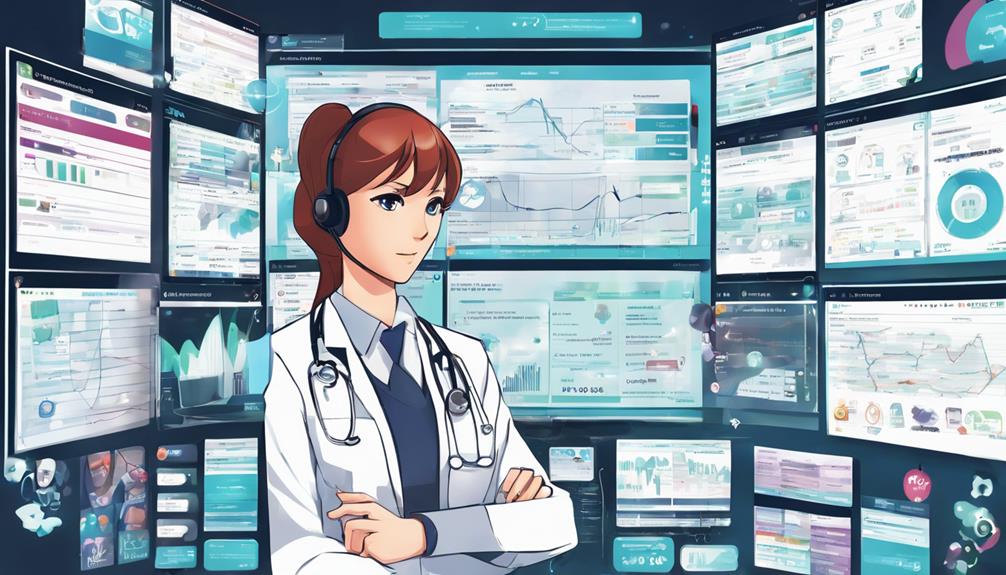Leveraging Healthcare CRM for Smarter Sales and Marketing
Utilize Healthcare CRM for sharper sales and marketing. Optimize strategies with personalized interactions and targeted campaigns. Data-driven insights drive decision-making, predicting trends and behaviors. Automate processes for efficiency, enhancing personalized interactions. Analyze patient feedback for continuous improvement. Implement CRM systems for tailored care plans and communication. Revolutionize with informed decision-making, personalized interactions, and automation tools.
Key Takeaways
- Implement Healthcare CRM for personalized patient care.
- Utilize CRM data for targeted marketing campaigns.
- Analyze patient feedback to enhance sales strategies.
- Train staff on effective communication and problem-solving.
- Integrate feedback mechanisms for real-time insights.
Importance of Healthcare CRM
Understanding the pivotal role of Healthcare CRM is essential for optimizing sales and marketing strategies in the competitive healthcare industry. Patient engagement and sales performance are important aspects that Healthcare CRM can greatly impact.
By utilizing Healthcare CRM effectively, you can enhance patient engagement through personalized interactions and targeted communication. This personalized approach not only improves patient satisfaction but also fosters long-term relationships, leading to increased loyalty and retention rates.
Moreover, Healthcare CRM plays a crucial role in improving sales performance by providing valuable insights into patient behavior, preferences, and trends. With this data-driven information at your disposal, you can tailor your sales strategies to meet the specific needs of patients, resulting in higher conversion rates and improved ROI.
Personalizing Patient Communications
For enhancing patient engagement and driving sales performance in the healthcare industry, personalizing patient communications is a strategic imperative. Communication customization allows healthcare organizations to connect with patients on a more personal level, fostering trust and loyalty.
Here are four key strategies to effectively personalize patient communications:
- Segmentation: Utilize CRM data to segment patients based on demographics, health conditions, or engagement history. This allows for tailored communication that resonates with specific patient groups.
- Personalized Content: Craft messages that speak directly to the individual patient's needs, preferences, and health goals. Personalization creates a sense of being understood and cared for.
- Multichannel Approach: Engage patients through various channels such as email, SMS, social media, and phone calls. By meeting patients where they are, healthcare providers can enhance communication effectiveness.
- Feedback Integration: Encourage patients to provide feedback and preferences, then use this data to further refine and personalize future communications. Feedback loops are essential for continuous improvement in patient engagement strategies.
Implementing these personalized communication strategies can notably improve patient engagement and drive positive outcomes in healthcare sales and marketing efforts.
Data-Driven Insights for Decision Making
To optimize your healthcare sales and marketing performance, harnessing data-driven insights for decision making is crucial. By leveraging predictive analytics and strategic planning, you can uncover valuable trends and patterns within your customer data. Through data visualization techniques, complex information can be transformed into easily digestible visuals, providing you with actionable insights to steer your sales and marketing strategies effectively.
Predictive analytics enables you to anticipate future trends and behaviors, empowering you to make proactive decisions rather than reactive ones. By analyzing historical data and identifying correlations, you can make informed predictions about patient preferences and behaviors. This strategic approach allows you to tailor your marketing efforts to align with the needs and expectations of your target audience.
Furthermore, integrating data visualization tools into your CRM system enhances your ability to interpret data quickly and accurately. These tools allow you to spot trends, outliers, and opportunities at a glance, enabling you to make data-driven decisions with confidence. Embracing data-driven insights in your decision-making processes can greatly enhance the effectiveness of your healthcare sales and marketing initiatives.
Automation Tools for Efficiency
To boost efficiency in your healthcare CRM strategy, consider streamlining data entry processes, enhancing personalized interactions with patients, and optimizing lead nurturing efforts. By automating these tasks, you can save time, reduce manual errors, and create a more streamlined sales and marketing workflow.
These automation tools can help your team focus on high-value activities and drive better results in customer engagement and conversion rates.
Streamlining Data Entry
Efficiency in data entry can be greatly enhanced through the implementation of automated tools in healthcare CRM systems. Utilizing these tools not only improves data accuracy but also saves time, allowing your team to focus on more critical tasks.
Consider the following strategies to streamline your data entry process:
- Optical Character Recognition (OCR) Technology: Implement OCR tools to automatically extract text from scanned documents, reducing manual entry errors.
- Auto-Population Features: Utilize auto-population fields to fill in repetitive data across records swiftly and accurately.
- Real-Time Data Validation: Incorporate validation rules to guarantee data integrity at the point of entry, avoiding future inaccuracies.
- Integration with Electronic Health Records (EHR): Seamlessly link your CRM system with EHR platforms to transfer patient data efficiently, eliminating duplicate entries.
Enhancing Personalized Interactions
By leveraging automation tools in healthcare CRM systems, personalized interactions can be enhanced to optimize efficiency and effectiveness in engaging with patients and clients. Customized recommendations and tailored messaging can be facilitated through data-driven algorithms that analyze patient behavior, preferences, and medical history.
These tools allow for the creation of targeted communication strategies that resonate with individual patients, increasing the likelihood of positive engagement and outcomes. Automation streamlines the process of delivering personalized interactions at scale, ensuring that each patient feels valued and understood.
Optimizing Lead Nurturing
Lead nurturing in healthcare CRM systems can be greatly optimized through the strategic implementation of automation tools, enhancing efficiency in engaging and converting potential clients. To achieve this optimization, consider the following strategies:
- Email Marketing: Utilize automated email campaigns to deliver targeted and personalized content to leads at the right time, nurturing them through the sales funnel.
- Lead Scoring: Implement lead scoring mechanisms to prioritize leads based on their interactions and engagement levels, allowing for more focused and effective follow-up strategies.
- Behavioral Tracking: Use automation tools to track lead behavior on your website or platform, enabling tailored communication that resonates with their interests.
- Drip Campaigns: Set up automated drip campaigns that deliver a series of relevant messages over time, keeping leads engaged and moving them towards conversion.
Targeted Campaign Strategies
To optimize your healthcare CRM for effective targeted campaign strategies, analyze patient demographics and behavior patterns. By segmenting campaigns based on these insights, you can improve customer engagement and increase conversion rates. Conducting ROI analysis on different campaign strategies will allow you to allocate resources more efficiently, focusing on the initiatives that yield the highest returns. Utilize the data captured in your CRM to personalize communication with patients, tailoring messages to their specific needs and preferences. This level of customization can greatly enhance the effectiveness of your campaigns.
| Campaign Segmentation | ROI Analysis | Customer Engagement |
|---|---|---|
| Demographics | High ROI on Email Campaigns | Personalized Messages |
| Behavior Patterns | Low ROI on Social Media Ads | Targeted Offers |
| Geographic Location | Medium ROI on Direct Mail | Interactive Content |
Enhancing Patient Experience
Analyze patient feedback and satisfaction metrics to identify opportunities for streamlining processes and improving service quality, ultimately enhancing the overall patient experience. By leveraging data-driven insights, healthcare organizations can strategically enhance patient satisfaction and loyalty through personalized care delivery.
Here are four key strategies to contemplate:
- Utilize CRM data: Implement CRM systems to gather patient information and preferences, enabling tailored care plans and communication strategies.
- Patient journey mapping: Map out the patient experience from initial contact to post-treatment follow-up, identifying touchpoints for improvement and personalization.
- Feedback integration: Integrate patient feedback mechanisms into CRM systems to capture real-time insights and address concerns promptly, leading to improved patient satisfaction.
- Training and empowerment: Provide staff with training on empathetic communication and problem-solving skills to ensure patients feel heard and valued throughout their healthcare journey.
Conclusion
By leveraging healthcare CRM for smarter sales and marketing, you can revolutionize your approach to patient engagement. With data-driven insights at your fingertips, you can personalize communications, streamline processes, and target specific demographics with precision.
In fact, studies show that organizations using CRM systems experience a 41% increase in customer retention.
Don't miss out on the opportunity to enhance patient experience and drive business growth with this powerful tool.







